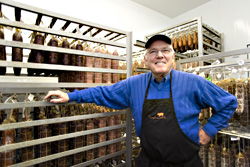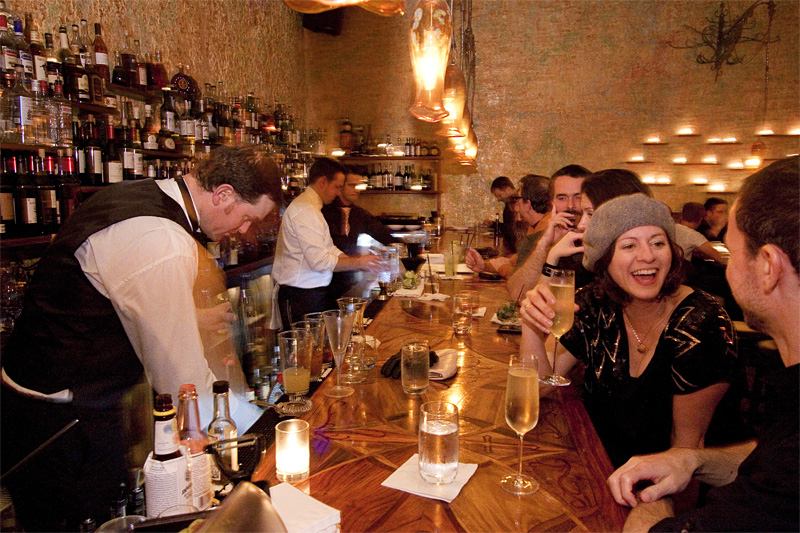In October 2006, Seattle Weekly announced the first recipient of the Angelo Pellegrini Award to honor someone for his or her lifetime contribution to food in the Puget Sound area. This year, we decided to expand on the idea by launching what will become the annual Seattle Weekly Food Awards. This issue honors three people or businesses who we feel have greatly contributed to—and continue to further—the vibrancy of our local food scene.
The Pellegrini Award
Recipient: Armandino Batali
If you’ve paid any attention to the city’s food sections and tourist guides, you’ve read the story of the founding of Batali’s Salumi Artisan Cured Meats: how Batali and his wife, Marilyn, grew up in Italian-American families on farms outside Yakima. How Armandino worked as an engineer for Boeing for 32 years, a job that took the family to Madrid for six years and then to London for another 12. How, when he retired, he apprenticed with a salami maker in New York as well as with two traveling butchers in Tuscany. How, in 1999, he and Marilyn returned to Seattle and opened a little deli with a salumi-making shop in back. They served traditional foods, yes, but stripped of pretense and priced affordably.
“We sold two sandwiches the first day,” he recounts, “and Marilyn was ecstatic.” These days, it can take 45 minutes to make it through the order line, and every chef, food writer, and crazed gastronome visiting Seattle makes a pilgrimage to Pioneer Square. (It doesn’t hurt that son Mario is a household name.)
Just beyond the meat slicer and sandwich makers, Salumi’s communal table is as much the business’ raison d’être as the culatello and sopressata. In Salumi’s first few years, Armandino and Marilyn ran one of Seattle’s first family-style dinners: On Saturday nights, a dozen guests would take over the kitchen and cook and eat—a Seattle tradition that lives on with the underground dinners organized by Gypsy and the Sunday suppers at Dinette. The communal table is also what draws a lot of those customers standing in the rain: They know that once they sit, their workday fades away; they’ll chat with the people around them, and spend a few hours in the unencumbered present.
Even though daughter Gina and son-in-law Brian D’Amato have largely taken over the business, every Thursday the table is still where you’re likely to encounter Batali’s unforced smile and broad-palmed handshake. Sit down near him, and stories of Europe and favorite meals bubble up, unforced, with no need to impress. Chat a while longer, and your sandwich order may be augmented with little tastes of dishes that come up in conversation—a chunk of pork cheek, a few slices of cotechino sausage.
Armandino has helped inspire a nationwide resurgence of interest in artisanal meat curing, which Salumi continues to further; in 2007, it launched an annual salumi-judging contest as part of the Festa Italiana that last year drew 80 entries from around the nation. It’s a difficult art to resuscitate here: The Italians he trained under relied on sight and smell, touch and memory, to know how a sausage should be properly cured (in decidedly unsterile surroundings, to boot). But the USDA requires a technical process with validation studies and quality-control procedures—and with the possibility of listeria or salmonella threatening every batch, no room for error. “We had to marry the artisanship of making salumi and the family relationship of the restaurant to what the government required.” Armandino says. “It was no easy feat.”
His desire to balance tradition and modernity is also found in novel sausages like the mole salami and lamb prosciutto. “America is a foodies’ paradise, and the chefs are young, technically smart, ambitious people,” Armandino says. “We wanted to offer them something different that hadn’t been the same salami for 800, 900 years.”
Yet he’s practically anti-American in his desire to keep the business small, high quality, and in the family. Gina and Brian have spent five years learning the technical requirements of salumi-making, finally completing the equivalent of a master’s thesis: creating a new salami (their agrumi) to prove to Armandino that they could keep the business moving forward.
Why was it not enough for them to duplicate his successes? Armandino recalls discovering in Italy a recipe book that promised 1,500 traditional salumi recipes—but when he began to page through, he realized the book contained no amounts, curing instructions, or even complete lists of ingredients. A legacy shouldn’t be measured in tablespoons or temperatures, he seems to be saying. What’s important is to pass on care for the work and a gift for hospitality. That Batali has done, abundantly.






